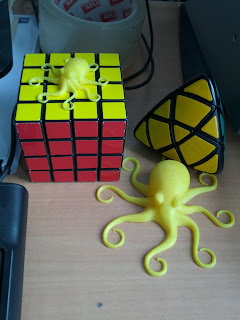Some quotes from SIROCCO 2023, a CS conference earlier this month.
"Everything's computation. Any process evolving and solving problems over time is computation." - Yuval Emek. An expression of the "computation is a metaphor for everything" that I hadn't heard framed this way before.
"Artificial neural nets use all kinds of swanky functions." - Frederik Mallman-Trenn
"... so first we need to understand what a human is. I'm oversimplifying a lot, but a human has a head and a body..." - Frederik Mallman-Trenn taking the physicists' approach to framing a problem
"This is the tapas version of the talk... I'm going to be going over a lot of topics to give you a taste of them." - Joshua Daymude
"There's so many dimensions here that we have not yet found one algorithm to rule them all." - Joshua Daymude, expressing an unscripted pervasiveness of Tolkien in popular culture
"This is a crowd that lies proofs, so I don't want to show off my simulations and offend anybody." - Joshua Daymude
"Roger is going to be talking about 'swarm intelligence', if that even exists." - Andréa Richa, introducing the next speaker's talk about swarm intelligence with a devastating level of objectivity
"I don't know how to solve this and I'm afraid to go back and tell them this, so you should help me! I want to hear your ideas." - Roger Wattenhofer, with an earnest appeal to the crowd that I can only imagine comes from unassailable tenure-granted confidence and seniority
[many inscrutable self-notes about the legibility of different presenters' slides, diagrams, and presentation styles]
The mildest possible theory praise: "I think you're touching upon the challenges of this area." - Michael Schapira
"Deep learning is voodoo. We can't debug it, we don't know how it works..." - Michael Schapira
"How do I know in real time that my decisions are no longer sound?" - Michael Schapira, expressing a CS question but also a question which suits intoxicated people
"The nice thing about this algorithm is... but the very horrible thing is, it uses infinite memory." - Bernadette Charron-Bost, expressing a truly beautiful "theory person has found a tradeoff" provable fact
The phrase "we need to use more elbow oil" was mentioned and my brain took a minute to figure out that the non-native English-speaking presenter probably meant the idiom "elbow grease", which on further inspection is a bizarre and faintly disgusting idiom.
Discussing the topic of algorithmic recommendation systems: "It's maybe something questionable from the moral point of view. But it's certainly interesting and I will not talk about it." - Boaz Patt-Shamir
This post's theme word is: craic (n), "good times involving pleasant company, enjoyable conversation, etc." Many speakers reminded us that SIROCCO is the 'fun' conference and is full of craic and jollity.







